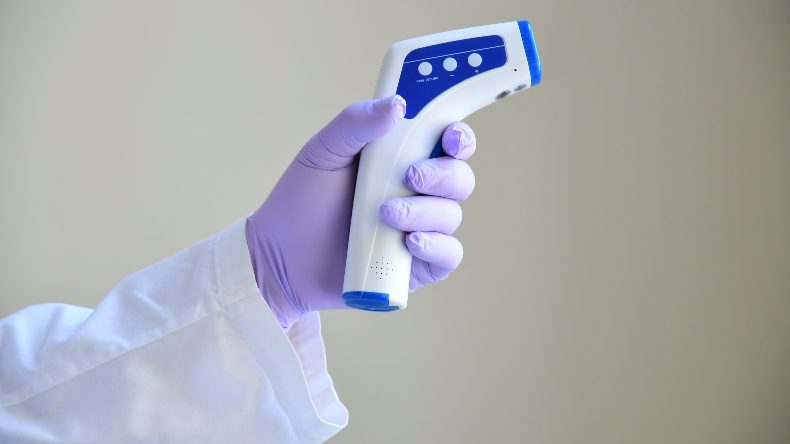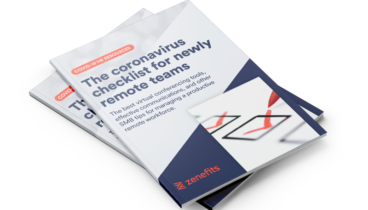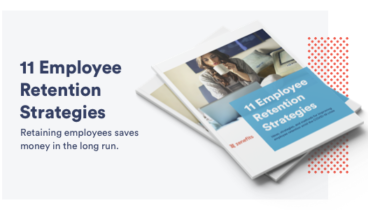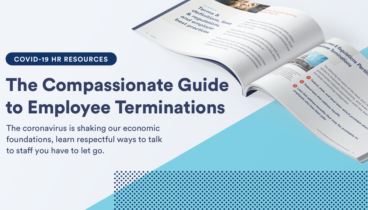Temperature checks can help determine if an employee is sick and may be at risk of having the coronavirus. Here’s what employers need to know before requiring them.

Here's what you need to know:
-
Currently, you can legally require temperature checks. The EEOC recently made temperature checks legal in light of COVID-19
-
It’s important to remember that some people with COVID-19 do not have a fever, and some people might have a fever from a flu that’s unrelated to COVID-19
-
Many experts agree that taking temperatures and sending employees home with pay if they have a fever or refuse to have their temperature taken is in the best interest of everyone
-
For temperature takers, make sure to provide them PPE and no-touch thermometers, and confirm their understanding of confidentiality requirements
-
If you want more information on the legality of temperature checks, contact an HR professional to help guide you
If you’re a small business owner who has reopened their business or in a US state ready to reopen, the safety of your employees and customers or clients is top priority. For many businesses, this may mean temperature checks for employees to help ascertain if a person is ill and may be at risk of having coronavirus.
But can you actually require temperature checks of your employees? Or is it illegal?
Currently, you can legally require temperature checks. The Equal Employment Opportunity Commission recently made temperature checks legal in light of COVID-19. This policy has been in place since March 18, 2020, and there is no scheduled date for the policy to end. Now, your next question might be if temperature checks actually work.
For many businesses operating in the midst of a pandemic, temperature checks can be both job-related and a business necessity.
According to the EEOC, “measuring an employee’s body temperature is a medical examination.” The Americans with Disabilities Act prohibits any type of medical exam unless the exam relates to a job and counts as “business necessity.” For many businesses operating in the midst of a pandemic, temperature checks can be both job-related and a business necessity.
How temperature checks can help
The Centers for Disease Control and Prevention, as well as other reputable health authorities, states that COVID-19 (a respiratory illness) is easy to spread and precautions should be taken. This requires, according to the CDC, the realization that “employers may measure employees’ body temperature.”
However, it’s important for employers to remember that some people with COVID-19 do not have a fever. In addition, some people might have a fever from a general flu that’s unrelated to COVID-19. Regardless, if you or your employees have a fever — whether from COVID-19 or not — it’s best to stay home or work remotely in order to stop the unnecessary spread of illness.
The National Employment Law Institute’s director of ADA services, David Fram, says that employers taking temperatures is a decision that is and should be allowed under the current circumstances. However, he also cautions employers to “be super careful about taking temperatures, in part because what does it really tell you?”
Knowing someone has a fever does not mean or suggest that they have COVID-19. With this consideration, some attorneys suggest that employees who are sent home because they have a fever should be paid for their missed work (if they aren’t already covered under employee benefits) to avoid any potential future legal repercussions. Workers who get sent home because of a fever may receive paid sick leave depending on their local law, contract with their employer, or through the Families First Coronavirus Response Act.
How to prepare
Just because an employer legally can require employees to have their temperatures taken doesn’t mean employees will agree. “Required” does not mean physically forced.
Policies to consider:
- Can you send someone home (without pay) who refuses to have their temperature taken?
- What precautions do you have in place to ensure the results of temperature testing are confidential (which they have a requirement to be, as it is a medical exam)?
Ultimately, many experts agree that taking temperatures and sending employees home with pay if they have a fever or refuse to have their temperature taken is in the best interest of everyone. It could potentially save lives, and it can also safeguard business owners.
It’s also important to keep in mind social distancing best practices at all times, including when taking temperatures. Oral thermometers are not as effective as infrared digital thermometers, so many small businesses likely need to stock up on the best medical supplies.
Employers should also bear in mind that, depending on their business, taking temperatures of all employees daily can be time consuming. Employees should be paid for their time spent waiting to have their temperature taken. This will probably require some tweaking of usual schedules.
Ultimately, many experts agree that taking temperatures and sending employees home with pay if they have a fever or refuse to have their temperature taken is in the best interest of everyone.
Getting ready
In an ideal situation, a volunteer would get proper training, then be in charge of taking everyone’s temperatures. Using PPE and no-touch thermometers, as well as having an understanding of confidentiality requirements, any non-medical person can be a good match for taking temperatures and helping to increase workplace safety.
Vaccinated and unvaccinated workers with COVID-19 symptoms should be immediately separated from other employees, customers, and visitors, and sent home or to a healthcare facility, depending on how severe their symptoms are, and follow CDC guidance for caring for oneself. To prevent stigma and discrimination in the workplace, make employee health screenings as private as possible. The CDC recommends that anyone with signs or symptoms of COVID-19 be tested and follow the advice of their healthcare provider. Waiting for test results prior to returning to work is recommended to keep potentially infected workers out of the workplace.
Employers are encouraged to implement flexible sick leave and supportive policies and practices as part of a comprehensive approach to prevent and reduce transmission among employees.
A medical professional on-site would be great, but it’s ultimately not necessary or feasible.
If you do select a non-medical employee to take temperatures, a plan should be in place to keep them safe as well. These questions will help with preparation:
- How will this person be selected?
- What kind of additional training will they receive to help reduce their risk of COVID-19 exposure?
- What measures are in place or will be in place to ensure confidentiality of readings?
- Will taking temperatures affect employee morale in a negative way, and if so, are there any steps you can take to temper this?
The answers to these questions will vary from business to business.
Temperature checks are a common procedure and a means of preventing further spread of COVID-19. They have, thus far, proven helpful and useful to a variety of businesses in all industries and of all sizes. If you want more information on the legality of temperature checks, an attorney may help guide you.





